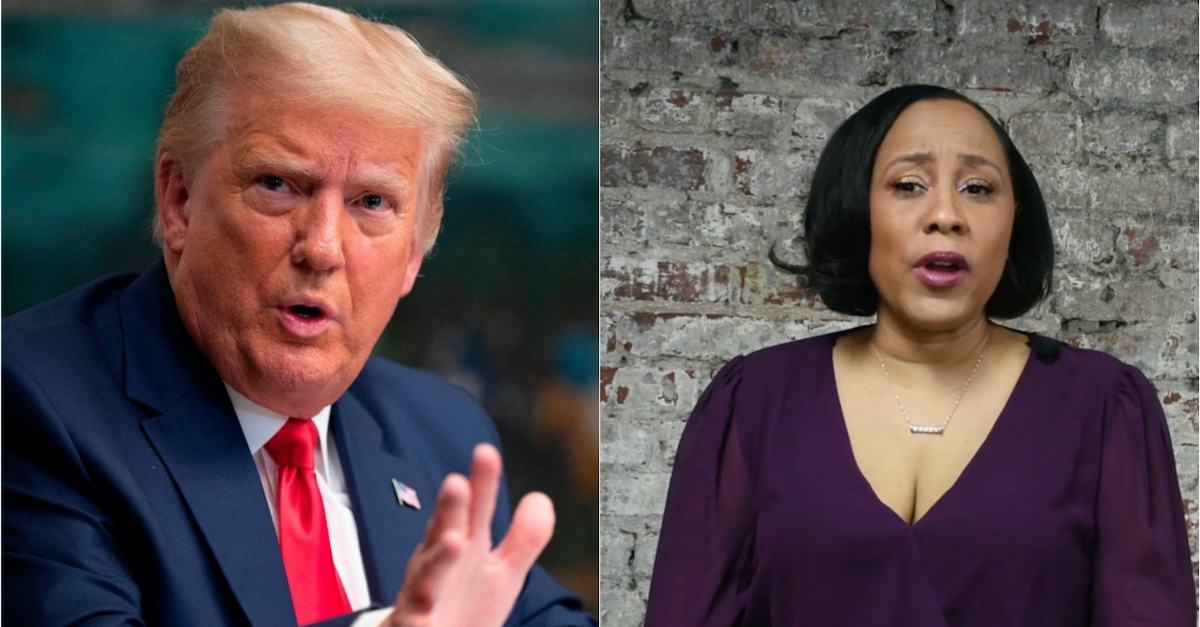
Donald Trump and Fulton County DA Fani Willis
A judge authorized a plan to empanel special grand jury to investigate former President Donald Trump’s effort to overturn the 2020 presidential election results in Georgia, days after the top prosecutor of the state’s most populous county requested the probe.
Fulton County District Attorney Fani Willis (D) made her request in a two-page letter to the Superior Court’s Chief Judge Christopher S. Brasher last Thursday.
“Please be advised that the District Attorney’s Office has received information indicating a reasonable probability that the State of Georgia’s administration of elections in 2020, including the State’s election of the President of the United States, was subject to possible criminal disruptions,” Willis wrote in a letter dated Jan. 20.
As first reported by the Atlanta Journal-Constitution, Brasher gave her the green light on Monday to empanel a special grand jury “for a period not to exceed 12 months.”
“Such period shall not include any time periods when the supervising judge determines that the special purpose grand jury cannot meet for safety or other reasons,or any time periods when normal court operations are suspended by order of the Supreme Court of Georgia or the Chief Judge of the Superior Court,” the order, published by AJC, states. “The special purpose grand jury shall be authorized to investigate any and all facts and circumstances relating directly or indirectly to alleged violations of the laws of the State of Georgia.”
The special purpose grand jury can probe Trump’s infamous phone call urging Georgia Secretary of State Brad Raffensperger (R) to “find 11,780 votes,” but it would not be empowered to return an indictment.
“This authorization shall include the investigation of any overt acts or predicate acts relating to the subject of the special purpose grand jury’s investigative purpose,” Brasher’s order said.
Though Trump attempted to subvert the 2020 presidential election through various methods in several states, Georgia is where his quest came into sharpest focus. Trump’s phone call with Raffensperger, since published by the Washington Post, laid bare the then-lame duck president’s campaign to pressure an election official to “find” the precise number of votes to edge out Joe Biden.
Trump also warned Raffensperger it would be “a big risk to you” and “very dangerous” to insist that there was “no criminality” in the administration of the Georgia election, comments widely described as attempted intimidation.
On the same call, Trump labeled then-U.S. Attorney Byung “BJay” Pak a “never Trumper” and ousted him days later. Pak later told the Senate that Trump would have fired him if he did not resign. Pak’s replacement Bobby Christine, previously of the Northern District of Georgia, resigned.
Willis cited Trump’s meddling with the various prosecutors’ office’s in explaining why she should head the investigation.
“Our office has also learned that individuals associated with these disruptions have contacted other agencies empowered to investigate this matter, including the Georgia Secretary of State, the Georgia Attorney General, and the United States Attorney’s Office for the Northern District of Georgia, leaving this office as the sole agency with jurisdiction that is not a potential witness to conduct related to the matter,” she wrote.
According to the letter, Raffensperger—an essential witness to the investigation—indicated in an interview with “Meet the Press” that he would not voluntarily agree to an interview or provide evidence without a subpoena.
Though the special grand jury can recommend charges against Trump, it cannot return an indictment, and experts disagree about the viability of any potential case. The Brookings Institute examined various possible charges Trump could face, ranging from misdemeanors like failing to perform an official duty to felonies like election interference and Georgia’s Racketeer Influenced and Corrupt Organizations (RICO) Act.
“To be sure, RICO statutes were enacted with organized crime in mind, but over the past half century, federal and state RICO laws have been used more broadly to target criminal enterprises engaged in patterns of criminal conduct,” the 114-page report stated. “As we described above, Trump’s multifaceted and sustained effort to subvert the count and certification of the election in Georgia may include a host of distinct state crimes.”
Atlanta-based defense attorney Andrew Fleischman, who works for the firm Ross & Pines, LLC, told Law&Crime, splashed cold water on that analysis, saying that a special grand jury smacks of a bid to delay what would be a difficult prosecution to square with the First Amendment.
“If you are trying to keep a politically advantageous investigation process going as long as possible without making an indictment, this is what you would do,” Fleischman said.
(Photo of Trump via Nicholas Kamm/AFP/Getty Images/ Photo of Willis via screenshot of video on DA’s website)